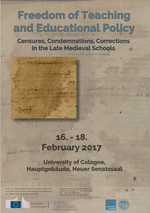
FREEDOM OF TEACHING AND EDUCATIONAL POLICY CENSURES, CONDEMNATIONS, CORRECTIONS IN THE LATE MEDIEVAL SCHOOLS
(16.-18. FEBRUARY 2017)
University of Cologne - Hauptgebäude, Neuer Senatssaal
Condemnations, censures, and corrections animated the academic debates around several speculative problems between the 13th and 14th centuries. The bases for these intricate antagonisms were surely philosophical or theological divergences, but also prejudices and political struggles. Then, a multifaceted process, characterized by a dialectic tension between a desired freedom of teaching and monitoring processes, influenced teaching and learning activities in the late medieval schools and universities. Accordingly, a significant number of commentaries, handbooks, and treatises for the schools was edited in order to revise and to be able to use condemned theses and doctrines for teaching activities.
William of Peter of Godin (c.1260-1336), a “leading figure within the Dominican Order” (Martin Grabmann), was one of the main exponents in this debate. Besides his status as an appreciated theologian at the University of Paris, William was Master of Sacred Palace and Papal legate. Therefore, his works should be seen as an attempt to amalgamate speculative contents, political pressures, and religious convictions. In particular, his Commentary on the Sentences, the Lectura Thomasina, written around 1300, is a paradigmatic example of rectification and adaptation of philosophical and theological theses in relation to school curricula programs. In fact, by harmonizing doctrines which Thomas Aquinas asserted in his early writings with positions assumed at the end of his life, William does not aim to write a mere collection of Thomas’ dicta, but rather a teaching compendium in line with the educational policies, yet true to Thomas’ intentions. Over the years, the text became a sort of authorized handbook for students and in the Dominican schools, but frequently in other universitary institutions, the Lectura replaced the direct lecture of Aquinas’ texts, until it came to represent a primary approach to his thought.
The conference intends to explore the speculative and political function assumed by the condemnations, corrections and censures in teaching and learning theological and philosophical doctrines in the late medieval universities and schools. Then, by assuming the Lectura Thomasina as typical example, the debate will focus on the connections between the promulgation of innovative ideas and their assumption and teaching in the educational context.